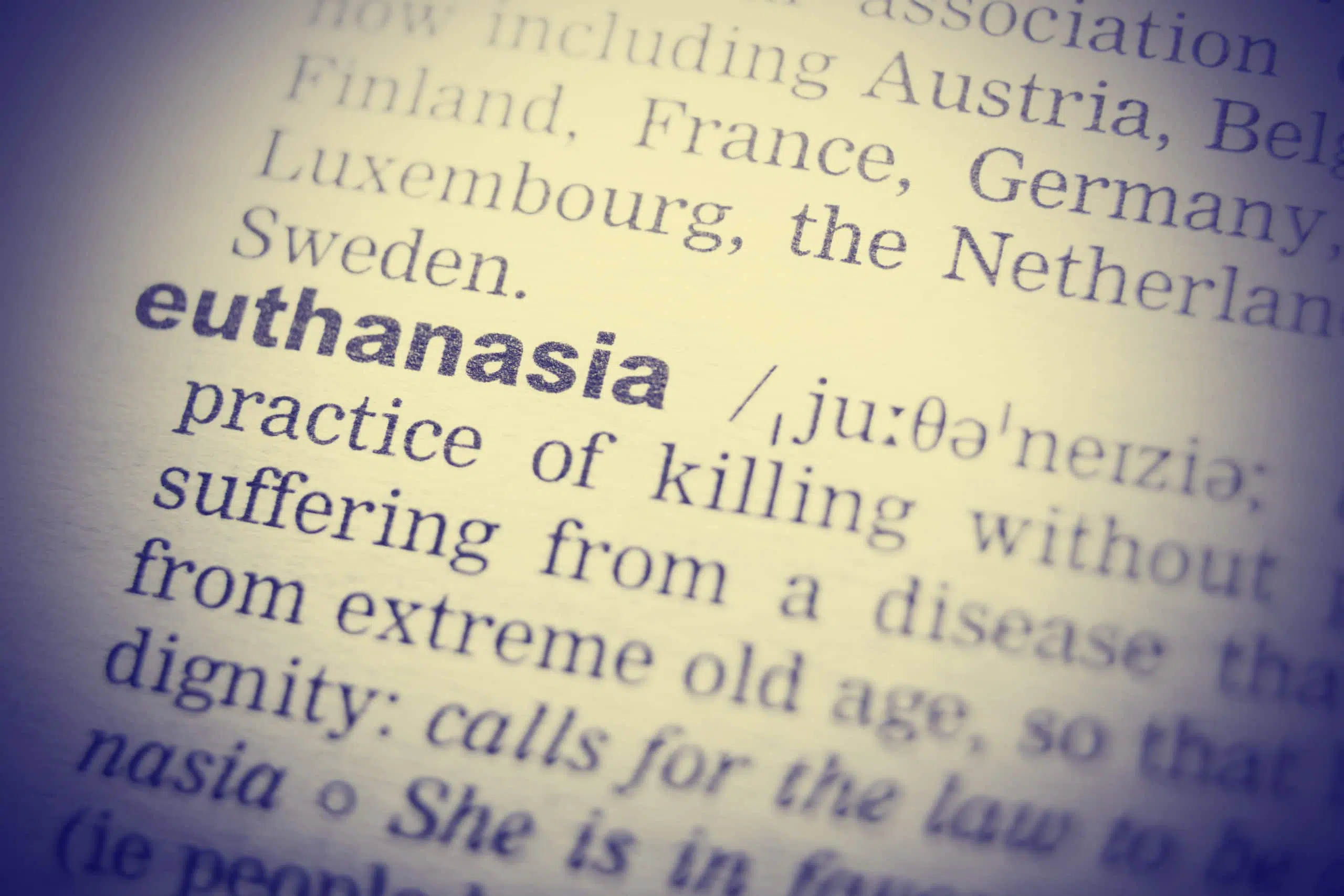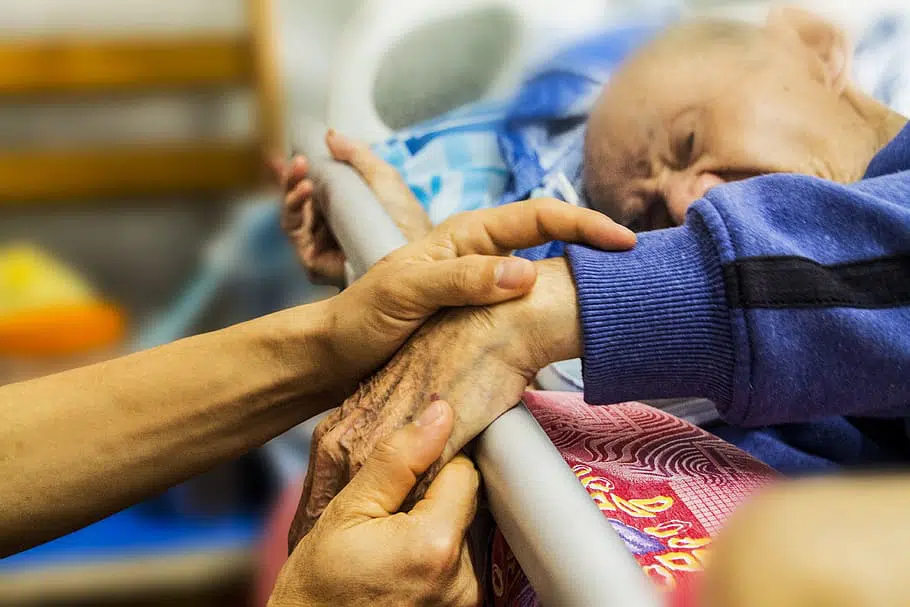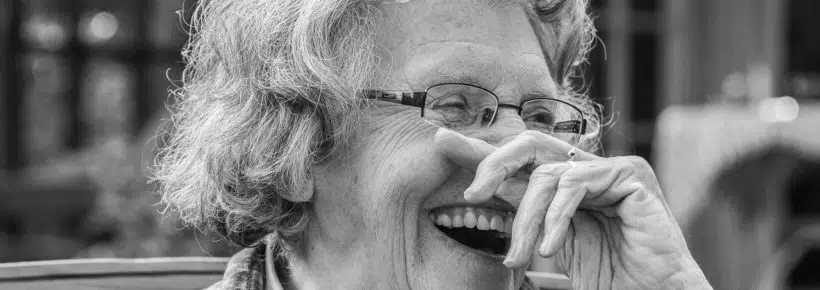In nine states and in Washington, DC, it is legal to decide the day of your own death should you feel that your suffering is too much to bear. Though this is defined as euthanasia—according to Merriam-Webster, “the act or practice of killing or permitting the death of hopelessly sick or injured individuals…in a relatively painless way for reasons of mercy”—proponents of this heinous act prefer the euphemism “death with dignity.”

But regardless of what the secular world calls it, taking the life of an innocent person—sick, elderly, disabled, or otherwise—is both wrong and immoral. We know this because the Catechism of the Catholic Church teaches that “whatever its motives and means, direct euthanasia consists in putting an end to the lives of handicapped, sick, or dying persons. It is morally unacceptable.” It further teaches that “those whose lives are diminished or weakened deserve special respect” (2277).
Respect for the sanctity and dignity of all human beings is an integral part of a Culture of Life. Yet the world erroneously teaches that people should be able to decide when they die. This takes the power out of the hands of God and gives it to man. Not only that, but it makes those who are sick and dying believe that they are burdens who should lighten the load for their caregivers, when it should be the caregivers who lighten the load for the sick and dying.
How do we know this? We read stories throughout the Bible that teach about the sanctity of life. We see teachings that prohibit murder. We see teachings commanding us to love one another. We see passages commanding us to give of ourselves to others. And we read about the value of suffering.
God gave us His words in the Bible so that we could learn how to live and how to love our fellow human beings. This biblical worldview guides us along our path to eternity with Him; and furthermore, ignoring God’s words not only hurts us, but it hurts others as well. That’s why it’s so important to read and understand what the Bible teaches.
Bible Verses about Euthanasia
Below are several inspiring Bible verses that teach us the importance of respecting and caring for our fellow human beings. When we read and reflect on these, we will come to know our Lord better. We will understand His commands and want to live our lives accordingly.
Verses Prohibiting Killing
“No one is master of the breath of life so as to retain it, and none has mastery of the day of death.” – Ecclesiastes 8:8
“Whoever takes the life of any human being shall be put to death.” – Leviticus 24:17
“You shall not kill.” – Exodus 20:13
“There are six things the Lord hates, yes, seven are an abomination to him [including] haughty eyes, a lying tongue, hands that shed innocent blood.” – Proverbs 6:16-17
Verses Commanding Care for Others
“Then the king will say to those on his right, ‘Come, you who are blessed by my Father. Inherit the kingdom prepared for you from the foundation of the world. For I was hungry and you gave me food, I was thirsty and you gave me drink, a stranger and you welcomed me, naked and you clothed me, ill and you cared for me.” – Matthew 25:34-36
“Is anyone among you sick? He should summon the presbyters of the church, and they should pray over him and anoint [him] with oil in the name of the Lord, and the prayer of faith will save the sick person, and the Lord will raise him up.” – James 5:14-15
“Those who shut their ears to the cry of the poor will themselves call out and not be answered.” – Proverbs 21:13
“Rescue the lowly and poor; deliver them from the hand of the wicked.” – Psalm 82:4
Verses on Human Dignity
“Do not rebuke an older man, but appeal to him as a father. Treat younger men as brothers, older women as mothers, and younger women as sisters with complete purity.” – 1 Timothy 5:1-2
“No one hates his own flesh but rather nourishes and cherishes it, even as Christ does the church.” – Ephesians 5:29
“Do not cast me aside in my old age; as my strength fails, do not forsake me.” – Psalm 71:9
“Do you not know that you are the temple of God, and that the Spirit of God dwells in you? If anyone destroys God’s temple, God will destroy that person; for the temple of God, which you are, is holy.” – 1 Corinthians 3:16-17
Verses Teaching Compassion
“Put on then, as God’s chosen ones, holy and beloved, heartfelt compassion, kindness, humility, gentleness, and patience.” – Colossians 3:12
“Urge the younger men, similarly, to control themselves, showing yourself as a model of good deeds in every respect, with integrity in your teaching, dignity, and sound speech that cannot be criticized.” – Titus 2:6-8
“Bear one another’s burdens, and so you will fulfill the law of Christ.” – Galatians 6:2
“If someone who has worldly means sees a brother in need and refuses him compassion, how can the love of God remain in him? Children, let us love not in word or speech but in deed and truth.” – 1 John 3:17-18
Verses Teaching Love
“You shall love your neighbor as yourself.” – Matthew 22:39
“Husbands, love your wives, even as Christ loved the church and handed himself over for her to sanctify her, cleansing her by the bath of water with the word.” – Ephesians 5:25-26
“Love one another with mutual affection; anticipate one another in showing honor.” – Romans 12:10
“Love is patient, love is kind…. It bears all things, believes all things, hopes all things, endures all things.” – 1 Corinthians 13:4-7
“Do not neglect to do good and to share what you have; God is pleased by sacrifices of that kind.” – Hebrews 13:16
Verses about Suffering with Joy
“We even boast of our afflictions, knowing that affliction produces endurance, and endurance, proven character, and proven character, hope, and hope does not disappoint, because the love of God has been poured out into our hearts through the holy Spirit that has been given to us.” – Romans 5:3-5
“Consider it all joy, my brothers, when you encounter various trials, for you know that the testing of your faith produces perseverance.” – James 1:2-3
“But rejoice to the extent that you share in the sufferings of Christ, so that when his glory is revealed you may also rejoice exultantly.” – 1 Peter 4:13
“The God of all grace who called you to his eternal glory through Christ [Jesus] will himself restore, confirm, strengthen, and establish you after you have suffered a little.” – 1 Peter 5:10
The Evil of Euthanasia
It’s not easy to care for someone who is sick or dying. In fact, it can be incredibly difficult and draining—emotionally and physically. Yet the Church clearly teaches that we must love and care for people with compassion.
Caring for loved ones means that we must never allow them to believe they are burdens. Caring for them means we must see the face of Christ in them. It means we must see them through Christ’s eyes and reflect Christ’s love.
The term “death with dignity” is an immense deception. Every single person—regardless of ability—has dignity. Dignity is something we inherently have as human beings. We do not lose it. And we do not need to die to have or retain dignity. Yes, there may be some occasions or times in life that make us feel sad, humiliated, embarrassed, or ashamed. These may include allowing others to care for us. But those are just feelings. And those feelings do not mean an absence of dignity.
Seeing people through the eyes of Christ means that we must have compassion for them. Compassion never results in the taking of someone’s life. True compassion lies in walking with the suffering person, caring for him, and serving him.
Finding Joy in Suffering
Before Mary appeared to the children at Fatima, an angel appeared and spoke with the children. He told them they were to sacrifice daily. When Lucia asked how they should sacrifice, he responded: “With all your power offer a sacrifice as an act of reparation for the sinners by whom He [the Lord] is offended, and of supplication for the conversion of sinners.”
In other words, our suffering helps others! That’s why the Church teaches the redemptive value of suffering. We believe that good can come from all suffering. How is this so? When we suffer, we can offer it up for a soul in purgatory. We can also offer it up for someone else who is sick here on earth. Knowing that our suffering is helping others can create great joy within us—if we let it. Knowing that we’re growing closer to God also helps us feel that joy.
Furthermore, when we suffer, we unite ourselves with Christ on the cross. We experience a small part of what He experienced when He gave His life for us, and we give a small part of ourselves to Him in return. This brings us closer to eternal life with Him.
St. John Paul II explains this in Salvifici Doloris (On the Christian Meaning of Human Suffering):
As the individual takes up his cross, spiritually uniting himself to the Cross of Christ, the salvific meaning of suffering is revealed before him. He does not discover this meaning at his own human level, but at the level of the suffering of Christ. At the same time, however, from this level of Christ the salvific meaning of suffering descends to man’s level and becomes, in a sense, the individual’s personal response. It is then that man finds in his suffering interior peace and even spiritual joy.
Final Thoughts
While euthanasia is a grave evil, we must understand that we are not required to use extraordinary means to keep our loved ones alive. The Catechism teaches: “Discontinuing medical procedures that are burdensome, dangerous, extraordinary, or disproportionate to the expected outcome can be legitimate; it is the refusal of ‘over-zealous’ treatment. Here one does not will to cause death; one’s inability to impede it is merely accepted.”
For example, when a frail and elderly woman has battled cancer and is near the end of her life, she need not feel obligated to continue treatment that will make her sicker.
Only God should have control over life and death, so we must never do anything to hasten death.
We know that God’s love for us is immeasurable; we can see this love every time we look at the crucifix.
Our suffering leads us closer to Him. And isn’t that the whole point of life?
Further reading:
Related Content
Susan Ciancio has a BA in psychology and a BA in sociology from the University of Notre Dame, with an MA in liberal studies from Indiana University. Since 2003, she has worked as a professional editor and writer, editing both fiction and nonfiction books, magazine articles, blogs, educational lessons, professional materials, and website content. Fourteen of those years have been in the pro-life sector. Currently Susan writes weekly for HLI, edits for American Life League, and is the editor of its Celebrate Life Magazine. She also serves as executive editor for the Culture of Life Studies Program, an educational nonprofit program for k-12 students.















I hate to say it, but I hope all of you to sign up to this evil of withholding euthanasia from people who are terminally ill and suffering unimaginable pain that you too will feel this pain. It’s so easy from your ivory towers to read passages of biblical text but to watch somebody dying in agony, brings no comfort.
I don’t care if Christians decide that they will never accept euthanasia, but you must not decide for the rest of us. That is our choice not yours.
I find it laughable that when you read these texts of the sanctity of life, how the Bible itself calls for the death of people for indiscretions this is the hypocrisy of biblical poppycock.
Keep your biblical nonsense to yourselves.
I never really gave this much thought, but this article was really inspirational. I have an elderly grandfather with dementia, and I feel more confident when I have to care for him. Thank you!
Thank you for sharing this with us. This is the concrete explanation of Euthanasia which really bothers me since I came across this issue. I will bear this in mind and share it with friends.
These thoughts and considerations are very important and I would like to thank Human Life International and all of the team for the wonderful work you do in exposing the evils of the culture of death. My (non-Christian) father fought in the Second World War. Although that was a war that Britain entered into as a matter of national survival, before long it was also fought to defend the right of all individuals and races to live in equality and freedom. To my amazement I see the culture of death encroaching on all sides and mimicking in many ways the evils that Hitler perpetrated. So once again thank you for the wonderful work that you do in exposing evil and upholding righteousness and the sanctity of all human life – both in the womb and outside it. God bless you all.
I really enjoyed this article. I will keep these thoughts with me as my father ages and to make sure he never feels like a burden. The link t0 “the value of suffering “ brings peace to the burden. Thank you!!!